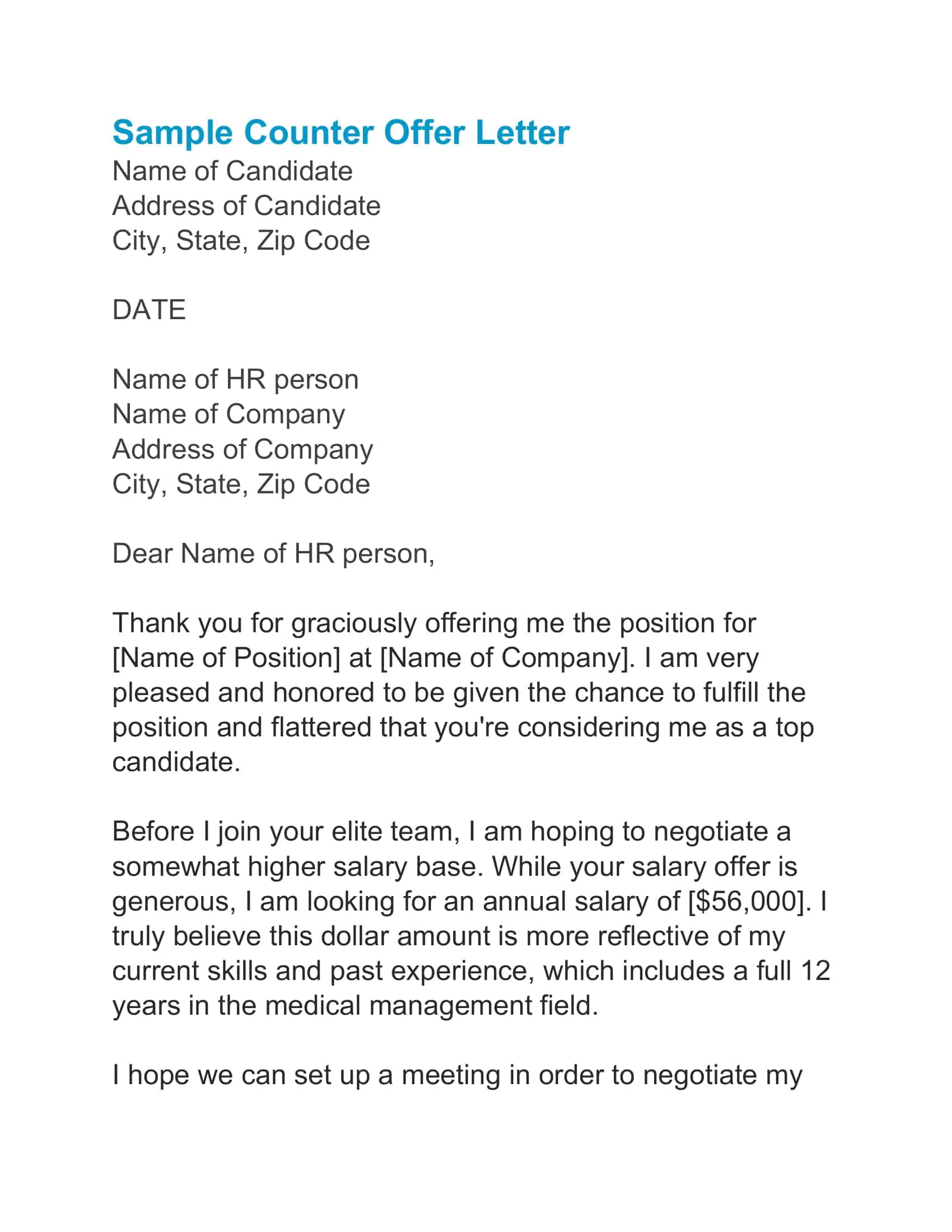Negotiating Your Salary: Even After A 'Best And Final' Offer

Table of Contents
Understanding the "Best and Final" Tactic
The phrase "best and final offer" is often a negotiating tactic, not a definitive statement. While it might feel like a brick wall, understanding its purpose is the first step to breaking through.
- Employer Pressure: Employers frequently use this tactic to pressure candidates into accepting the offer quickly. They aim to leverage the perceived finality to discourage further negotiation.
- Negotiation Flexibility: It doesn't automatically mean no room for negotiation exists. Many employers use this as a starting point, anticipating further discussion.
- Perspective is Key: Consider the employer's perspective. They likely have a budget and internal approval processes. Your negotiation needs to align with their realities.
- Testing Your Skills: This is a test of your negotiation skills. Your response demonstrates your confidence, preparedness, and ability to advocate for your worth. Successfully navigating this situation shows you're a strong candidate who values their skills.
Strategies for Negotiating After a 'Best and Final' Offer
Even after a "best and final" offer, several strategies can help you improve your compensation package.
Reiterate Your Value
This isn't about demanding more; it's about calmly and confidently reminding them of the unique value you bring.
- Highlight Skills and Experience: Focus on your specific skills and experience that directly address their needs and the job description.
- Quantify Achievements: Use concrete data and metrics to illustrate your past successes. Instead of saying "increased sales," say "increased sales by 15% in the last quarter."
- Demonstrate ROI: Emphasize the return on investment (ROI) the company will receive from hiring you. Translate your skills into quantifiable benefits for the company, such as cost savings, improved efficiency, or increased revenue.
- Examples: "My experience in streamlining workflows at my previous company resulted in a 10% reduction in operational costs." or "My proven track record of exceeding sales targets by an average of 20% makes me a strong candidate for this position."
Address Concerns and Counter-Offers
Did the interview reveal any concerns from the employer? Use this opportunity to address those directly.
- Politely Acknowledge Concerns: Start by acknowledging any concerns they may have raised during the interview process. Show that you listened and understand their perspective.
- Structured Counter-Offer: Craft a counter-offer that addresses those concerns while justifying your desired salary.
- Focus on Specifics: Instead of simply asking for a higher salary, suggest specific adjustments, like a signing bonus, enhanced benefits package (health insurance, retirement contributions, paid time off), or a faster track to promotion.
- Example Phrasing: "While I appreciate the offer, I was hoping for a salary closer to $X, reflecting my experience in Y and projected contribution to Z. Perhaps we could explore a signing bonus to bridge the gap?"
Leverage Other Offers (If Applicable)
If you have other offers, use them ethically to strengthen your negotiation position.
- Ethical Mentioning: Subtly mention you have other attractive offers without divulging specifics. The key is to convey your desirability, not to boast.
- Market Value: This demonstrates your market value and strengthens your position. It shows you're not desperate and have options.
- Justify Increase: This information provides concrete justification for your requested salary increase.
- Example: "I've received other competitive offers that more closely align with my salary expectations based on my skills and experience."
Walk Away (As a Last Resort)
This is a powerful tactic, but use it judiciously and only if you're prepared for the consequences.
- Know Your Worth: Only consider walking away if the offer is significantly below your minimum acceptable salary and you're confident in your abilities to find a better opportunity.
- Confidence is Key: Walking away demonstrates confidence in your abilities and value. This can sometimes prompt the employer to reconsider.
- Potential Consequences: Be prepared for the possibility that they might not increase the offer. It's a risky move, but can sometimes be highly effective.
Post-Negotiation Steps
Once you've engaged in the negotiation, it's important to handle the next steps professionally.
Review the Revised Offer Carefully
If they counter with a revised offer, take time to review the full package.
- Thorough Review: Don't only focus on the salary. Examine all aspects, including benefits, bonuses, and other perks.
- Written Confirmation: Get everything in writing to avoid future misunderstandings.
- Document Everything: Make sure all agreed-upon points, including salary and benefits, are clearly documented in your offer letter.
Express Gratitude
Regardless of the outcome, maintain professionalism.
- Express Appreciation: Always express your gratitude for their time and consideration.
- Professionalism: Maintain a respectful and professional attitude throughout the entire process, even if the negotiation doesn't yield your desired outcome.
Conclusion
Negotiating your salary is a crucial skill, and it's particularly challenging when faced with a "best and final offer." However, by understanding the underlying tactics, highlighting your value, strategically presenting your counter-offer, and knowing when to walk away, you can significantly increase your chances of securing a higher salary. Remember to carefully consider all aspects of any offer and don't hesitate to continue your salary negotiation, even when faced with a perceived final offer. Mastering the art of salary negotiation will empower you to command the compensation you deserve. Don't be afraid to advocate for your worth! Your future financial well-being depends on it!

Featured Posts
-
 Netflixs New Drama Series A Darkly Funny Show With A White Lotus Star And Oscar Winner
May 23, 2025
Netflixs New Drama Series A Darkly Funny Show With A White Lotus Star And Oscar Winner
May 23, 2025 -
 Big Rig Rock Report 3 12 Rock 101 Trucking Industry Insights
May 23, 2025
Big Rig Rock Report 3 12 Rock 101 Trucking Industry Insights
May 23, 2025 -
 Englands Winter Blues Yearning For The Champions Trophy
May 23, 2025
Englands Winter Blues Yearning For The Champions Trophy
May 23, 2025 -
 The End Of The Penny Us To Halt Penny Circulation By Early 2026
May 23, 2025
The End Of The Penny Us To Halt Penny Circulation By Early 2026
May 23, 2025 -
 Tva Group Ceo Blames Streamers And Regulators For 30 Job Losses
May 23, 2025
Tva Group Ceo Blames Streamers And Regulators For 30 Job Losses
May 23, 2025
Latest Posts
-
 Unexpected Joe Jonas Concert Thrills Fort Worth Stockyards Crowd
May 23, 2025
Unexpected Joe Jonas Concert Thrills Fort Worth Stockyards Crowd
May 23, 2025 -
 Fort Worth Stockyards An Unforgettable Night With Joe Jonas
May 23, 2025
Fort Worth Stockyards An Unforgettable Night With Joe Jonas
May 23, 2025 -
 Dc Legends Of Tomorrow Frequently Asked Questions And Answers
May 23, 2025
Dc Legends Of Tomorrow Frequently Asked Questions And Answers
May 23, 2025 -
 The Last Rodeo Exploring Neal Mc Donoughs Character
May 23, 2025
The Last Rodeo Exploring Neal Mc Donoughs Character
May 23, 2025 -
 A Deep Dive Into Dc Legends Of Tomorrow
May 23, 2025
A Deep Dive Into Dc Legends Of Tomorrow
May 23, 2025
